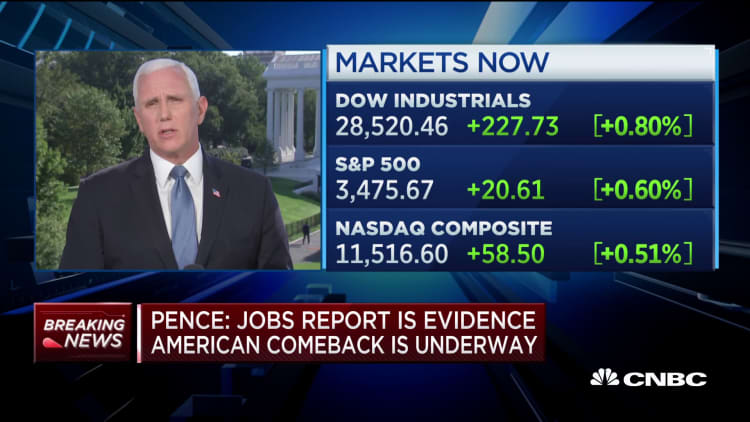
The Trump administration and Congress have agreed to pass a bill to avoid a government shutdown without tying funding to separate measures such as coronavirus relief, Vice President Mike Pence said Friday.
Approving a continuing resolution, which would temporarily set federal spending at current levels, would not inject the heated politics of pandemic aid into efforts to keep the government running.
"Now, we can focus just on another relief bill, and we're continuing to do that in good faith," he told CNBC's "Squawk on the Street."
Government funding will lapse if Congress does not pass legislation before the end of the month. Speculation had grown that congressional leaders could try to include coronavirus relief measures in a spending package as a way to gain leverage in stimulus negotiations that have barely moved forward since they fell apart last month.
Pence's comments Friday indicated the stalemate over how much money to put into boosting the economy could linger. Democrats have pushed the Trump administration to increase the price tag on their stimulus offer to at least $2.2 trillion from about $1.3 trillion. The White House has not yet budged.
Pence criticized Democrats over perhaps the largest remaining sticking point in talks. Democratic leaders want more than $900 billion in new aid to cash-crunched state and local governments, while the Trump administration has offered $150 billion.
"We're not going to allow Democrats in Congress to use a coronavirus relief bill to bail out poorly run Democratic states," the vice president said.
The bipartisan National Governors Association has asked for at least $500 billion more in state and municipal aid. Governments have warned of possible cuts to essential services as they take on more costs and lose revenue during the pandemic.
Pence repeatedly made the case for another round of stimulus checks as part of the fifth coronavirus rescue package. He said "nobody wants to give direct payments to American families more than Donald Trump again."
The vice president spoke to CNBC after the Labor Department reported U.S. nonfarm payrolls increased by 1.37 million and the unemployment rate dropped to 8.4%. Pence called the data "real evidence that the American comeback is underway."
The jobless rate remains significantly higher than it was before the Covid-19 outbreak hit the U.S. earlier this year. Permanent job losses in August also increased by 534,000 to 3.4 million.
"8.4% unemployment is nothing to brag about," Senate Minority Leader Chuck Schumer, D-N.Y., wrote in response to President Donald Trump's Friday morning tweet celebrating the jobs report.
Despite four straight months of strong employment growth, the expiration of enhanced unemployment insurance and a federal moratorium on evictions has led to concerns of sharper suffering for many Americans. Even so, after Friday's jobs report, White House economic advisor Larry Kudlow told Bloomberg that "we can live with" not striking a coronavirus relief deal, according to Reuters.
In the absence of congressional action to address those and other coronavirus relief measures, the Trump administration has taken limited steps to offer aid on its own.
On Tuesday, the White House moved to halt evictions until the end of the year using Centers for Disease Control and Prevention authority. It followed the administration's executive actions to temporarily extend extra jobless benefits for some Americans, continue student loan assistance and forgive the employee portion of the payroll tax.
Senate Republicans aim to take up a narrow pandemic aid plan when they return from their August recess next week. Democrats oppose the roughly $500 billion proposal, meaning it likely will not get through Congress and become law.



